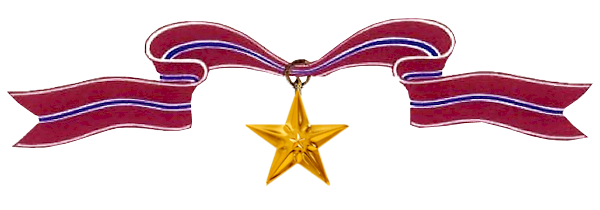The President of the United States of America takes pleasure in presenting a Second Gold Star in lieu of a Third Award of the Bronze Star Medal with Combat “V” to Major William McReynolds (MCSN: 0-7189), United States Marine Corps, for meritorious service in connection with operations against the enemy while serving with a Marine artillery regiment in Korea from 26 November to 3 December 1950. Major McReynolds, serving as an artillery battalion commander, displayed outstanding professional skill and courage in the performance of his duties. By his outstanding leadership and tireless efforts, he supervised and directed the maximum of accurate fire missions in support of the infantry units. During the movement of his battalion from Yudam-ni to Hagaru-ri, Korea, he organized members of his battalion and supervised the guarding of vehicles loaded with wounded Marines. Although subjected to nearly constant enemy attacks, he directed his men so skillfully that the wounded received adequate protection and heavy casualties were inflicted on the enemy. A resourceful and aggressive leader, Major McReynolds’ actions were a constant source of inspiration to all who observed him and were directly instrumental in the success achieved by his battalion and the infantry units which he supported. Major McReynolds’ initiative and courageous actions were in keeping with the highest traditions of the United States Naval Service. (Major McReynolds is authorized to wear the Combat “V”.)

Awards Received
-

Bronze Star Medal
-

Silver Star
-

Legion of Merit
-

Bronze Star Medal
-
Bronze Star Medal

The President of the United States of America takes pleasure in presenting a Gold Star in lieu of a Second Award of the Bronze Star Medal with Combat “V” to Major William McReynolds (MCSN: 0-7189), United States Marine Corps, for meritorious service in connection with operations against the enemy while serving with a Marine artillery battalion prior to and during the amphibious assault on Inchon, Korea, the attack and liberation of Seoul, Korea, and the continuation of the advance to Wonson, Korea, from 25 July to 2 November 1950. Major McReynolds, acting as Commanding Officer, despite many adverse conditions, displayed outstanding professional skill and confidence in preparing for and moving his unit to the West Coast of the United States, integrating newly mobilized Reserve personnel into his battalion, activating a new firing battery, and expanding his organization to an effective war strength artillery battalion. By his aggressive reconnaissance, outstanding example of leadership and thorough knowledge of selection of position areas, he kept his battalion well forward and in a position to fulfill his mission of counter battery and general support, and to provide illumination over a 3,200 mile front. On several occasions, by virtue of his aggressiveness, his battalion was able to reinforce the artillery fires of direct support battalions against fanatical tank-led enemy counterattacks. His coolness under fire and actions were an inspiration to all members of his battalion and contributed materially to the success of the artillery regiment. Major McReynolds’ initiative and courageous actions were in keeping with the highest traditions of the United States Naval Service. (Major McReynolds is authorized to wear the Combat “V”.)
-
Silver Star
Service:
United States Marine CorpsRank:
Lieutenant ColonelBatallion:
3d BattalionRegiment:
11th MarinesDivision:
1st Marine Division (Rein.)Action Date:
August 22, 1951
Headquarters, X Corps, General Orders No. 228 (October 8, 1951)The President of the United States of America, authorized by Act of Congress July 9, 1918, takes pleasure in presenting the Silver Star (Army Award) to Lieutenant Colonel William McReynolds (MCSN: 0-7189), United States Marine Corps, for gallantry in action against the enemy while serving as Commanding Officer of the Third Battalion, Eleventh Marines, FIRST Marine Division (Reinforced), in action on 22 August 1951, in the vicinity of Tumil-li, Korea. On that date, the battalion was supporting the 36th Regiment, Republic of Korea Army, whose objective was to take the hill mass in front of Hill 940. Colonel McReynolds personally chose to direct the supporting fires of his battalion against the well-entrenched enemy positions. Continually exposed to heavy enemy small arms fire, he sought out enemy positions, directing artillery fire. The unusual accuracy of this fire resulted in staggering losses being inflicted on the enemy, forcing them to withdraw. His coolness under heavy enemy fire, his skillful direction of the fires of his battalion in support of the Republic of Korea Infantry, and the accuracy of this fire contributed immeasurably to the success of the operation. The gallantry, broad knowledge of artillery tactics, and professional skill displayed by Colonel McReynolds on this occasion reflect great credit on himself and the military service.
-
Legion of Merit
Service:
United States Marine CorpsRank:
Lieutenant ColonelRegiment:
11th MarinesDivision:
1st Marine Division (Rein.)Action Date:
December 4, 1950 – March 27, 1951
The President of the United States of America takes pleasure in presenting the Legion of Merit with Combat “V” to Lieutenant Colonel William McReynolds (MCSN: 0-7189), United States Marine Corps, for exceptionally meritorious conduct in the performance of outstanding services to the Government of the United States while attached to the Eleventh Marines, FIRST Marine Division (Reinforced), as Commanding Officer of the Fourth and subsequently the Third Battalion, during operations against enemy aggressor forces in Korea from 4 December 1950 to 27 March 1951. An inspiring and resourceful leader, Lieutenant Colonel McReynolds ably directed and employed his batteries to provide maximum artillery support for friendly forces despite the extreme difficulties imposed by inadequate firing positions, sub-zero temperatures and long logistical supply lines. Quick to appraise a critical tactical situation when he was faced with a minimum of personnel to guard his howitzers during the attack from Yudam-ni to Hagaru-ri, he reorganized his unit as an infantry battalion to provide effective protection for a hospital train and promptly assumed his artillery role upon arrival at the objective. During the reorganization and re-equipping of his battalion at Masan, Lieutenant Colonel McReynolds was eminently successful in reorganizing his outfit and was largely responsible for the high state of combat efficiency attained by his unit within a minimum amount of time. By his outstanding professional ability, sound judgment and zealous devotion to duty throughout, Lieutenant Colonel McReynolds contributed materially to the success achieved by the Division and upheld the highest traditions of the Marine Corps and of the United States Naval Service. (Lieutenant Colonel McReynolds is authorized to wear the Combat “V”.)
-
Bronze Star Medal
Service:
United States Marine CorpsRank:
MajorRegiment:
14th MarinesDivision:
4th Marine DivisionAction Date:
February 19 – March 16, 1945
The President of the United States of America takes pleasure in presenting the Bronze Star Medal with Combat “V” to Major William McReynolds (MCSN: 0-7189), United States Marine Corps, for meritorious achievement as Intelligence Officer of the Fourteenth Marines, FOURTH Marine Division, prior to and during the assault and capture of enemy Japanese-held Iwo Jima, Volcano Islands, 19 February to 16 March 1945. Planning and supervising a very broad and detailed schedule of training and instruction for all intelligence echelons of the regiment and giving lectures to other divisional units to further understanding of the intelligence needs of an artillery regiment, Major McReynolds made detailed and complex searches and reconnaissances of enemy positions as rapidly as they were overrun, in order that the information obtained could be utilized in subsequent fire support given to the infantry. His leadership and devotion to duty were in keeping with the highest traditions of the United States Naval Service. (Major McReynolds is authorized to wear the Combat “V”.)

